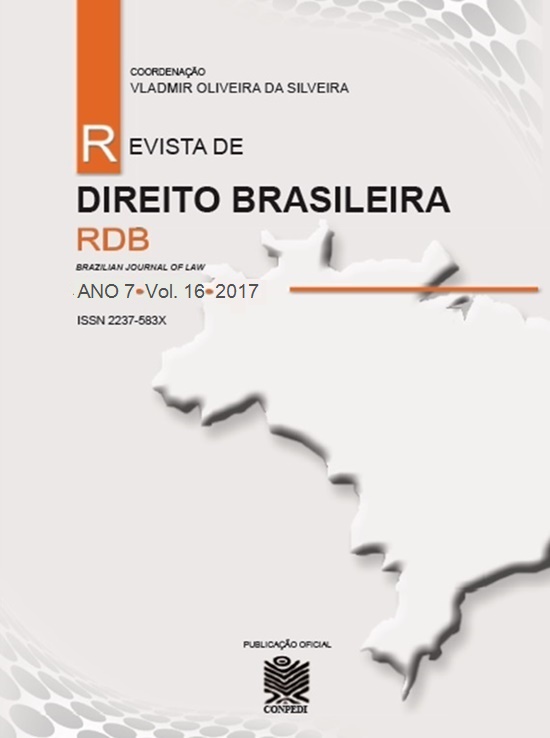BALANCING THE PRINCIPLE OF PUBLICITY AND THE RIGHT TO PRIVACY IN THE INFORMATIONAL SOCIETY: A HERMENEUTICAL CRITIQUE TO THE APPLICATION OF ALEXY’S LAW OF COLLISION IN BRAZIL
Main Article Content
Abstract
Downloads
Article Details
• O(s) autor(es) garante(m) que a contribuição é original e inédita e que não está em processo de avaliação em outra(s) revista(s);
• A revista não se responsabiliza pelas opiniões, ideias e conceitos emitidos nos textos, por serem de inteira responsabilidade de seu(s) autor(es);
• É reservado aos editores o direito de proceder ajustes textuais e de adequação do artigo às normas da publicação.
Autores mantêm os direitos autorais e concedem à revista o direito de primeira publicação, com o trabalho simultaneamente licenciado sob a Licença Creative Commons Attribution que permite o compartilhamento do trabalho com reconhecimento da autoria e publicação inicial nesta revista.
Autores têm autorização para assumir contratos adicionais separadamente, para distribuição não exclusiva da versão do trabalho publicada nesta revista (ex.: publicar em repositório institucional ou como capítulo de livro), com reconhecimento de autoria e publicação inicial nesta revista.
Autores têm permissão e são estimulados a publicar e distribuir seu trabalho online (ex.: em repositórios institucionais ou na sua página pessoal) a qualquer ponto antes ou durante o processo editorial, já que isso pode gerar alterações produtivas, bem como aumentar o impacto e a citação do trabalho publicado (Veja O Efeito do Acesso Livre) emhttp://opcit.eprints.org/oacitation-biblio.html
References
ARENA, Gregorio. La transparencia administrativa. In: Documentación Administrativa. Madri, n. 248-249, maio/dezembro de 1997, p. 361-405.
BAUMAN, Zygmunt. 44 cartas do mundo líquido moderno. Rio de Janeiro: Zahar, 2011.
BOBBIO, Norberto. Estado, governo, sociedade - para uma teoria geral da política. 8a ed. São Paulo: Paz e Terra, 1990.
__________. O Futuro da Democracia: Uma defesa das regras do jogo. 6. ed. São Paulo: Paz e Terra, 1997.
BRASIL. Constituição (1988). Brasília, DF, 05 out. 1988. Disponível em:
__________. Lei Complementar nº 101, de 04 de janeiro de 2000. Estabelece normas de finanças públicas voltadas para a responsabilidade na gestão fiscal e dá outras providências.. Dou. Brasília, 05 jan. 2000. Disponível em:
__________. Lei Nº 12.527, de 18 de novembro de 2011. Regula o acesso a informações previsto no inciso XXXIII do art. 5º, no inciso II do § 3º do art. 37 e no § 2º do art. 216 da Constituição Federal; altera a Lei nº 8.112, de 11 de dezembro de 1990; revoga a Lei nº 11.111, de 5 de maio de 2005, e dispositivos da Lei nº 8.159, de 8 de janeiro de 1991; e dá outras providências. Disponível em
__________. Supremo Tribunal Federal. Agravo Regimental. [...]. Suspensão de Segurança 3902 AgR-segundo/SP. Tribunal Pleno. Agravantes: Sindicato dos Especialistas de Educação do Ensino Público do Município de São Paulo – SINESP e Associação dos Engenheiros, Arquitetos e Agrônomos Municipais de São Paulo e outro (a/s). Agravado: Município de São Paulo. Relator(a): Min. Ayres Britto. Brasília, 09 de junho de 2011. Disponível em: < http://www.stf.jus.br/portal/jurisprudencia/listarJurisprudencia.asp?s1=%28ss+3902%29&bas e=baseAcordaos>. Acesso em: 27 mai 2015.
CAMPOS, Anna Maria. Accountability: quando poderemos traduzi-la para o português? Revista de Administração Pública, Rio de Janeiro, fev./abr. 1990. Disponível em:
CANOTILHO, José Joaquim Gomes. Direito Constitucional e Teoria da Constituição. 7. ed. Coimbra: Almedina, 2003
CELLA, José Renato Graziero; ROSA, Luana Aparecida dos Santos. Controle Social e Necessidade de Proteção de Dados Pessoais. Revista Democracia Digital e Governo Eletrônico, Florianópolis, v. 9, n. 1, p.158-171, jul. 2013. Disponível em:
FEITOSA, Gustavo Raposo Pereira; FREIRE, Geovana Maria Cartaxo de Arruda. Governo Eletrônico e Ciberdemocracia na Gestão Pública Brasileira. In: Joyceane Bezerra de Menezes; Renata Albuquerque Lima. (Org.). Justiça Social e Democracia. Florianópolis: Conceito Editorial, 2011, p. 179-202.
GOYARD-FABRE, Simone. O que é democracia?: A genealogia filosófica de uma grande aventura humana. São Paulo: Martins Fortes, 2003.
HESSE, Konrad. Elementos de direito constitucional da República Federal da Alemanha. Porto Alegre: Sérgio Antônio Fabris Editor, 1998.
LESSIG, Lawrence. Code and other laws of Cyberspace. 2. ed. New York: Basic Books, 2006. Disponível em:
LÉVY, Pierre. Cibercultura. São Paulo: 34, 1999.
__________. Ciberdemocracia. Lisboa: Piaget, 2003.
MARCUSE, Herbert. Tecnologia, Guerra e Facismo. São Paulo: Fundação Editora da Unesp, 1999. Editado por Douglas Kellner.
MEZZAROBA, Orides. A representatividade política na era da informação e o espaço reservado ao povo. In: ROVER, Aires José (Ed.). Inclusão Digital e Governo Eletrônico. Zaragoza: Prensas Universitarias de Zaragoza, 2008. Cap. 2. p. 39-52.
NAVARRO, Ana Maria Neves de Paiva. O direito fundamental à autodeterminação informativa. In: XXI Congreso Nacional do CONPEDI. Direitos Fundamentais e Democracia II. Florianópolis: FUNJAB, 2012. p. 410-438. Disponível em:
NOVAIS, Jorge Reis. As Restrições aos Direitos Fundamentais não Expressamente Autorizadas pela Constituição. 2. ed. Coimbra: Coimbra, 2010.
ORGANIZAÇÃO DOS ESTADOS AMERICANOS. Comissão Interamericana de Direitos Humanos. Denúncia. San José, Costa Rica. Disponível em:
RODOTÀ, Stefano. A vida na sociedade da vigilância: A privacidade hoje. Rio de Janeiro: Renovar, 2008.
WARREN, Samuel D.; BRANDEIS, Louis D. The Right of Privacy. In:Harvard Law Review, Harvard, v. IV, n. 5, dec. 1890, p. 214.
SOLOVE, Daniel J.. Conceptualizing Privacy. California Law Review,San Diego, v. 90, n. 4, p.1087-1156, jul. 2002. Disponível em:
__________. A Taxonomy of Privacy. University Of Pennsylvania Law Review, Pennsylvania, v. 154, n. 3, p.477-560, jan. 2006. Disponível em:





